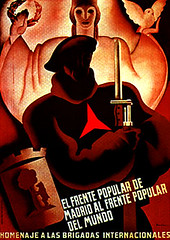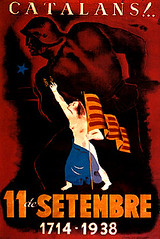American History X
That said, though, as a student of American history it's hard not to be contemptuous of anyone who would dare compare what the framers tried to do in Philadelphia to the deal that just went down in the Baghdad bazaar.
-- scorching Billmon post, "The Philadelphia Experiment"
Well, I say that all the time, as well, because the person who writes it in the short-term is somebody who is not going to have the advantage of time to look at history, look at the true history of the presidency. You know, it's amazing that - there's kind of an interesting George Washington now - Ellis has written a book which I'm reading now, and David McCullough is writing a book on George Washington. I read one earlier on Washington - I can't remember the name of it - Washington Crosses The Delaware - something - it was a very interesting book about some of the many - how he organized the army. The Alexander Hamilton book by Chernow, which is obviously about Hamilton, but it was about the time of George Washington and Washington plays a prominent role. It's very interesting, there's a resurgence in analyzing Washington, the first President, during the time of the 43rd President, which makes my point - that there's - history is always evolving, and people's appreciation of a President changes over time, as well - one way or the other.
-- GWB, Cal Thomas Interview, 2 Feb 2005
Look, history -- shall I give you my talk on history and presidencies? OK, thank you. What's interesting is George Washington is now getting a second or third or fifth or tenth look in history. I read the Ellis book, which is a really interesting book, and “His Excellency, “ it's called. McCollough's writing a book on George Washington as well.
-- GWB, , Press Conference, 16 March 2005
"I think that part of education is to expose people to different schools of thought," Bush said. "You're asking me whether or not people ought to be exposed to different ideas, the answer is yes."
-- GWB, "Bush: Intelligent Design Should be Taught", Associated Press, 2 August 2005
Like our own nation's founders over two centuries ago, the Iraqis are grappling with difficult issues, such as the role of the federal government. What is important is that Iraqis are now addressing these issues through debate and discussion -- not at the barrel of a gun.
-- GWB, Radio Address, 27 August 2005
I want our folks to remember our own Constitution was not unanimously received. Some delegates at the Philadelphia Convention in 1787 refused to sign it. And the draft was vigorously debated in every state and the outcome was not assured until all the votes were counted.
-- GWB, Presidential Address, 28 August 2005
-- scorching Billmon post, "The Philadelphia Experiment"
Well, I say that all the time, as well, because the person who writes it in the short-term is somebody who is not going to have the advantage of time to look at history, look at the true history of the presidency. You know, it's amazing that - there's kind of an interesting George Washington now - Ellis has written a book which I'm reading now, and David McCullough is writing a book on George Washington. I read one earlier on Washington - I can't remember the name of it - Washington Crosses The Delaware - something - it was a very interesting book about some of the many - how he organized the army. The Alexander Hamilton book by Chernow, which is obviously about Hamilton, but it was about the time of George Washington and Washington plays a prominent role. It's very interesting, there's a resurgence in analyzing Washington, the first President, during the time of the 43rd President, which makes my point - that there's - history is always evolving, and people's appreciation of a President changes over time, as well - one way or the other.
-- GWB, Cal Thomas Interview, 2 Feb 2005
Look, history -- shall I give you my talk on history and presidencies? OK, thank you. What's interesting is George Washington is now getting a second or third or fifth or tenth look in history. I read the Ellis book, which is a really interesting book, and “His Excellency, “ it's called. McCollough's writing a book on George Washington as well.
-- GWB, , Press Conference, 16 March 2005
"I think that part of education is to expose people to different schools of thought," Bush said. "You're asking me whether or not people ought to be exposed to different ideas, the answer is yes."
-- GWB, "Bush: Intelligent Design Should be Taught", Associated Press, 2 August 2005
Like our own nation's founders over two centuries ago, the Iraqis are grappling with difficult issues, such as the role of the federal government. What is important is that Iraqis are now addressing these issues through debate and discussion -- not at the barrel of a gun.
-- GWB, Radio Address, 27 August 2005
I want our folks to remember our own Constitution was not unanimously received. Some delegates at the Philadelphia Convention in 1787 refused to sign it. And the draft was vigorously debated in every state and the outcome was not assured until all the votes were counted.
-- GWB, Presidential Address, 28 August 2005


8 Comments:
This post just begins to touch on the Bush administration's profoundly un-Cartelian use of the Constitutional Convention as "intertext" for the Iraq disaster. WG, hy sentence, ko, myshkin, &y -- feel free to add or revise this post in any direction that seems fit.
I can't actually edit the post because I'm not the author--my blogger dashboard dealie only gives me edit power over my posts.
But on Jan. 30, 2005, Bush gave a sick interview to Brian Lamb on C-SPAN. Excerpts here, full transcript here.
A few excerpts of my own (but I do recommend reading the whole thing):
Bush: [H]istory really matters for the President. And so I read a lot of history books. I'm reading the Washington book by Ellis right now. I read the Hamilton book by [Chernow], which I thought was a fascinating book. I can't remember all the books I read, but I do read a lot of books. And from that, I'm able to gain a better appreciation of where we're going.
Aside by &y: "Chernow" is added in brackets to the original transcript--I'll try to endure watching the interview later and see if Bush remembered the author's name. And, sweet Jeebus: "I can't remember all the books I read." ??? Coming from practically anybody else on the planet, I could believe that. How can you lie to Brian Lamb?
Bush: ... And I think that history gives me a kind of -- it helps me better explain and understand exactly what we're seeing. And that's important for a policymaker to be able to grasp the realities of the situation based upon some historical lessons.
[...]
LAMB: How much reading do you do a day, and what time of day do you read?
THE PRESIDENT: I read, oh, gosh, I'd say, 10, maybe, different memoranda prepared by staff.
LAMB: What about books?
THE PRESIDENT: I'm reading, I think on a good night, maybe 20 to 30 pages. I'm exercising quite hard these days, and I get up very early. And so the book has become somewhat of a sedative.
I realize my comment doesn't really take the (fine) post in any new direction. I just put it up there fyi. I heard Malloy ranting and raving about this interview awhile back. American History X reminded me of it, so I looked it up.
Eager to see what other Cartelians have to add.
He said "Chernov." No idea why it was bracketed in the transcript.
Man, though. This interview is sick. If you can stomach it, the video is better than the written version. Link at the transcript site.
Great link; one for the books as GWB says. Can you imagine any other president so uncomfortable as to restort to this?:
"Fortunately, a lot of my life is documented now. I mean, this interview, for example, somebody will be going through the Bush records and see that George W. sat down with Brian Lamb, and we had a 40 minute interview, or whatever it was, on this day, at this time. That will be a part of the record."
Woof.
Let's think for a minute now: whose job do you suppose it is to select the books that Bush is "reading?" And who carves them into an easily digestible talking point or two when POTUS heads in to the interviews?
It'd be a helluva gig for a right-thinking bookworm, though you'd have to clear the snippets with Karl or Karen before on-air distribution.
I can see Curious George actually reading the biography of a past president whom he fancies he resembles. I've never had trouble believing that the man is conventionally intelligent: he's just so blinkered, so ignorant, so wedded to his Texan role-play that he comes off as a dunce. (Not that the role's an act: it's become who he is.)
And another thing. . .
So now it's a race to see whether the Sunnis, perhaps with help from the Sadrists, can sink the constitution by lining up three rejectionist provinces. I suspect that the only trouble they'll have getting the necessary votes in Anbar province and Salah Al-Din province (capitals Ramadi and Tikrit, respectively) will be in curbing the foreign jihadis who want to kill anyone daring to participate. (Come to think of it, if this ballot succeeds in driving a wedge between those who want an apocalyptic civil war and those who just want to regain power through a limited one, that might be its sole positive outcome.)
That gets the rejectionists 2/3 of the way there. To the north, in Nineveh (Mosul), there are many ethnic minorities who'll want to vote it down, too. What are the chances that the Kurds will allow a free and fair ballot in their area of influence, with everything riding on the outcome? Or the Shiite militias in the south?
That would be a great memorial to the soldiers we've lost: death squads in Interior Ministry uniforms, suppressing the vote the old-fashioned way. Someone's using a version of that tactic already.
My amateur prediction, offered before the invasion, is holding up pretty well. I said then that it boiled down to this. The US would win the war to topple Hussein; it would just be a matter of whether the cost in lives was 1,000 Americans and 10,000 Iraqis, or 10,000 Americans and 100,000 Iraqis. (The jury's still out on that one.) The real question was whether or not we'd leave behind a raging civil war when we left.
Post a Comment
<< Home